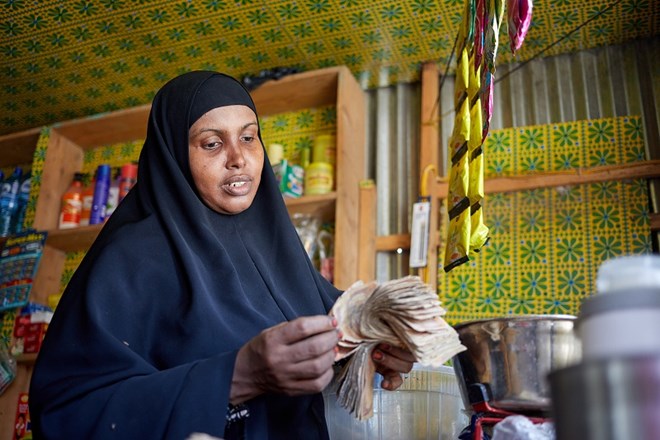By Ahmed M. Roble
Wednesday - December 1, 2021

In the historical study of Somali labour under
a pastoralist economy, livestock
represented the family’s wealth and has traditionally been the property of men
where women’s role was solely in the sales and exchanges of livestock products
such as milk and ghee, and spending those earnings on household needs.
As Somalia was modernizing and moving into a
post-colonial era women played a noble role hence facing severe gender inequalities
such as high maternal mortality, rape, female genital mutilation, and violence
against women and girls are nowadays becoming common, though statistical facts
and evidences are hardly to show.
The participation and role of women in political,
economic, social, and decision-making spheres are extremely limited, and across
the country, traditional or customary law is applied on women issues such as
rape, child-marriage rather than Islamic or state judiciary. There are plenty of
cases which can be considered in this context.
It is often rhetorically narrated in the
public Somali circles that a critical role Somali women had played during the
statelessness, peace-building but it is evident that it goes unrewarded and often
disregarded at the moments of political representations, decision-makings and the
country’s fate. Women’s participation in the country’s strategic directions are
missing which makes the evidence rather clear at this time of 2021 national
election consultation where women are absent in the table.
This piece, therefore attempts not only to log
into the entrepreneurial spirit of Somali women in the formal economy, secondly
it sheds lights on the distorted perception of women employability
opportunities such as women’s wages and salary gaps, a deserving space of servitude
and its prospects.
Breadwinners in the midst of Civil War
After
the state collapse, women in Somalia become certified bread-winners for the
families and by enlarge endeavored a long, and sometimes competitive challenges
in making a sound production through entrepreneurial ventures. Women committed
to put food in the table through initiatives starting from small businesses to
forming an airline, hotel and telecom companies whilst lacking necessary
entrepreneurial background.
The
entrepreneurial qualities are inherent and innate into the Somali women such qualities
are the drive, focus, honesty, teamwork and tenacity which are pivotal
characterization to succeed in the marketplace. These qualities coupled with
the requisite knowledge, investment and opportunity would’ve taken the game into
the par.
It
is unfortunate, and griming fact that such caliber are wasted and missing in
the major decision-making stages whether in the businesses, and private due to
primitive, and distorted perceptions derived from Arab culture, and with
misogynistic attitudes.
Observationally,
the employment of women are little due to the lack of space in our education
system with combination to cultural, and traditional reasons that deprives them
of the right to be employed in the best places of the private sector such as
financial, and telecom industries.
A
Deserving Space of Servitude
At the political level, a
great deal of legislations are needed as the newly approved women’s
charter signed in March 2019 calls for a 50% quota across the three levels
of government, for zero tolerance of gender-based violence, and for women’s
rights to be enshrined in the revised constitution and the finalized electoral,
security, and political laws.
The Politics of Clannish in
Somalia is one of the major barriers in establishing a women’s empowerment into
the political space of the country, and in addition to that, women are
perceived an unreliable representatives in the
political arena, because of their dual affiliation to their father’s and
husband’s clan. These primitive,
distorted and fading perceptions on women are more often derived from tradition,
culture and sometimes perverted religious jurisprudences.
Today, a deserving space of servitude is
direly needed as a certain number of research evidences inside Somalia reveal that
women in general have more decision-making power and influence over aspects of
their political, social and economic lives than ever before, but progress is
uneven across and within Somalia as the evidences based on women and politics
largely considers how participation is achieved in the political space rather
than unpacking the political processes by which women influence.
The Central to the consideration of women’s economic &
political participation and leadership is the concept of ‘women’s political
participation’ (WPP) which captures women’s ability to articulate their
concerns and have their interests represented, including to being able to
critically influence decision-making.
Women political participation also about understands where
power and decision-making are located in both state and federal spaces and how
women can be supported to access and influence these processes. In this
respect, WPE may extend beyond women’s representation and influence in
political office to capture women’s experiences in areas, including civil
society, business and service delivery.
Way
forward
In Somalia and in the other
developing countries the culture and social norms prevent women from realizing
their full potentiality, and safety concerns as well restricts to their
physical and economic mobility. In addition, gender inequities, lack of
enabling conditions in the workplace makes it more badly for women to actively
participate in the labor market. In the aftermath of the Covid-19 pandemic, a
holistic approach within the public and private partnerships could save this
ill-gotten and ravaging scenario from our women and pour them into taking
advantage to their potentiality. The initiatives of establishing Soft skills programs can improve girls’ and women’s
educational & health outcomes, improving the women’s mobility encourage them to continue their education and
participate in the labour force. Accesses to microfinance and small business enterprise development
increases female participation in the labour market in the long run. Providing
leadership access such as female managers could improve productivity in any
sector.
Ahmed M. Roble
Ahmed
holds an MBA in HR and currently pursuing an M.A in Peace Governance &
Development at the University for Peace. He serves as Head of Training &
Development, Central Bank of Somalia. He can be reached at ahroble27@gmail.com.